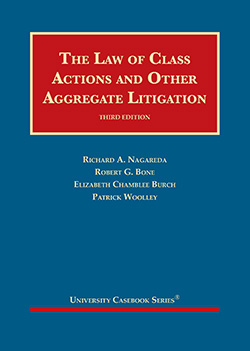- Home
- The Law of Class Actions and Other Aggregate Litigation
The Law of Class Actions and Other Aggregate Litigation
The third edition of this casebook reflects the many developments that have occurred in aggregate litigation since 2013 while continuing to treat the subject as a coherent whole. This edition includes a short, systematic introduction to the range of different aggregation techniques and then pays detailed attention to class actions, multidistrict litigation (MDL), parens-patriae suits, bankruptcy, and arbitration. In particular, this edition features a new chapter devoted to MDL, in which topics range from selecting the transferee court, choosing what law should apply, and exploring the judicial role in examining MDL’s effect on settlement and leadership selection. As before, the casebook does more than just present the law—it considers multiple perspectives on policy, litigation strategy, judicial practice, financial considerations, and empirical findings.
The book fills three gaps in the market for teaching materials on the U.S. civil justice system. First, it treats “aggregate litigation” as a cohesive field of law that encompasses all devices for processing claims
en masse. Second, the book confronts forthrightly the reality of our civil justice system as one geared toward settlement, not trial. From this vantage point, the casebook sees the processes for aggregate litigation as vehicles through which to achieve comprehensive, or broadly encompassing, resolution of related civil claims. Third, the book frames the legitimacy of preclusion in aggregate litigation by drawing, among other things, on conceptions of legitimacy in other settings, such as private contract and public legislation. In so doing, the casebook encourages students to see cross-cutting connections with their other courses on such topics as contracts, corporations, and administrative law.
Imprint: Foundation Press
Series: University Casebook Series
Publication Date: 07/09/2020
Richard A. Nagareda
Robert G. Bone, University of Texas School of Law
Elizabeth Chamblee Burch, University of Georgia School of Law
Patrick Woolley, University of Texas School of Law
CasebookPlus™
This title is available in our CasebookPlus format. CasebookPlus provides support beyond your classroom lectures and materials by offering additional digital resources to you and your students. Anchored by faculty-authored formative self-assessments keyed to our most popular casebooks, CasebookPlus allows students to test their understanding of core concepts as they are learning them in class – on their own, outside of the classroom, with no extra work on your part. CasebookPlus combines three important elements:
- A new print or digital casebook
- Access to a downloadable eBook with the ability to highlight and add notes
- 12-month access to a digital Learning Library complete with:
- Chapter questions keyed to the casebook
- Black Letter Law questions (available in select subjects)
- Subject area review questions for end of semester use
Leading digital study aids, an outline starter, and audio lectures in select subjects
Students can still utilize CasebookPlus digital resources if they’ve purchased a used book or are renting their text by purchasing the Learning Library at westacademic.com.
With CasebookPlus, you can customize your students’ learning experience and monitor their performance. The quiz editor allows you to create your own custom quiz set, suppress specific quiz questions or quiz sets, and time-release quiz questions. Additionally, the flexible, customized reporting capability helps you evaluate your students’ understanding of the material and can also help your school demonstrate compliance with the new ABA Assessment and Learning Outcomes standards.
The third edition of this casebook thoroughly updates and revises the second edition to take account of the many developments since 2013, while preserving the overall approach of the first and second editions, which treats aggregate litigation as a coherent whole. Chapter One has been tightened and revised to present a more systematic introduction to the range of different aggregation techniques. The materials on class actions in Chapter Two have been updated and, where possible, shortened. Among other things, the Chapter, replaces Klay v. Humana with In re NFL Concussion Litigation. This edition also debuts a new chapter devoted to comprehensively examining multidistrict litigation. It covers selection of the transferee court, choice of law, MDL’s effect on settlement, selection of lead counsel, judicial management, lead counsel’s duties to non-clients, aggregate settlements and related ethical issues, and judicial power to review settlements and award common-benefit fees. In addition, Chapter 4, on the Coordination of Aggregate Litigation, includes a new section on the effect of recent personal jurisdiction decisions on aggregate litigation; Chapter 6 incorporates current events such as the opioid crisis into the materials on bankruptcy and parens-patriae litigation, and Chapter 7 updates the materials on arbitration and aggregation.
Learn more about this series.
Access Denied
Law School Faculty - Sign in or Create an Account to access this content. Law faculty who have created an account can sign in after receiving email notification that registration has been approved. Email accountmanager@westacademic.com or call 800-313-9378 for assistance.
Other Higher Education Faculty who wish to access digital review copies or teaching resources should contact their West Academic Account Manager at college@westacademic.com or 800-360-9378.
Adopters Only
This content is intended for adopters only. Sign in or Create an Account to access this content. Law faculty who have created an account can sign in after receiving email notification that registration has been approved. If you are an adopter who is unable to access this content after signing in, contact your account manager for assistance at accountmanager@westacademic.com or call 800-313-9378 for assistance.
Access Denied
Sign in or Create an Account to access this content. Faculty who have created an account can sign in after receiving email notification that registration has been approved. Contact us for assistance.
Law School Faculty: email accountmanager@westacademic.com or call 800-313-9378.
Other Higher Education Faculty: email college@westacademic.com or 800-360-9378.
Access Denied
Higher education faculty who wish to view this document should contact their West Academic Account Manager at college@westacademic.com or 800-360-9378.
